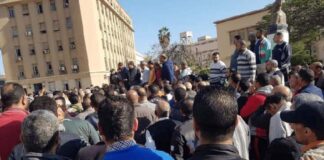Mohamed Morsi, the candidate of the Muslim Brotherhood, has taken office in Egypt’s Presidential elections. But he hasn’t taken power.
Egyptians celebrated the defeat of Ahmed Shafiq, the last Prime Minister under deposed leader Hosni Mubarak, and the electoral face of Egypt’s counter-revolution on June 24. Many feared that the Supreme Council of Armed Forces (SCAF), ruling Egypt with an iron fist since Mubarak’s fall, would declare Shafiq the winner and launch a full-scale coup.
That they were unwilling to rig the election results shows they still fear the revolution.

But while SCAF may have given Morsi the victory, in the lead-up to the announcement they pushed through a series of constitutional amendments that are a major attack on the gains of the revolution.
First, they handed themselves new powers to arrest civilians and detain them indefinitely for a huge range of political activities.
Next, they issued a decree granting themselves power to initiate legislation, control the budget, appoint a panel to draft the new constitution, and postpone elections until they approve that constitution. Then they entirely disbanded the Muslim Brotherhood dominated parliament.
The situation has already created a power struggle between the Brotherhood and SCAF. As we go to press, Morsi had reconvened parliament to sit in defiance of the generals. But he has cautiously declared that this was not about contradicting the ruling that formally dissolved the parliament.
Tensions
The Muslim Brotherhood’s leadership does not have the genuine interests of Egyptian workers at heart. Economically, they have the same neo-liberal program as SCAF.
The Brotherhood’s leadership has been cosying up to SCAF since the February revolution, hoping to win themselves a share of power and influence in running Egyptian capitalism.
In 2011, the Brotherhood mobilised their members in support of SCAF’s transition schedule and against the demands of the revolution, and called for an end to strikes to “keep the wheel of production turning.”
Even since the election, Morsi has appeared in public at a military parade with the head of SCAF and Mubarak’s go-to-man for torture, Field Marshall Tantawi.
But SCAF’s bid for power has put the Brotherhood in a position of having to mobilise its mass membership, who have been deeply radicalised by the revolution. In the midst of the elections, Brotherhood members and supporters flooded Tahrir Square in protest at SCAF’s “soft coup” as well as joining the mass demonstrations against the leniency shown in Mubarak’s trial.
Contradictions
Mobilising the Muslim Brotherhood’s base against SCAF holds the potential to expose the interests of the Brotherhood’s leadership to its more radical membership.
Those supporting the Brotherhood against SCAF expect reforms that the Brotherhood has no intention of delivering. They have faith in the Brotherhood because of its many years as the only major and semi-legal opposition force under Mubarak.
As one young worker in a job agency explained to Reuters, “The Brotherhood is from the poor, they understand… They were oppressed along with all us Egyptians the past 80 years, they have a plan and they know that we can’t go on like this.”
A key demand of the revolution has been “bread, freedom and social justice”, meaning for many an end to the poverty that characterised the Mubarak era. Up to 17 million Egyptians live on $1 a day. And as the economic crisis worsens, youth unemployment is running as high as 25 per cent. Egyptians expect the Brotherhood to deliver employment and a minimum wage.
But the International Monetary Fund (IMF), the World Bank and Egypt’s ruling class want SCAF and the Brotherhood to implement Europe-style austerity measures and hold back the burgeoning strike movement.
And the Brotherhood’s supporters expect Morsi to stand up to Israel and the West, and support the Palestinians. But Morsi has already promised to uphold the peace treaty with Israel.
The US and Israel are putting pressure on the Brotherhood to become a partner in their agenda in the Middle East. Hilary Clinton is set to visit Egypt and Obama has invited Morsi to visit the White House. Israeli Prime Minister Benjamin Netanyahu’s office released a statement after Morsi’s victory asserting that Israel expects “continued cooperation with the Egyptian administration”.
These contradictions between the intentions of the Brotherhood’s leadership and the expectations of its supporters will be tested on the streets in the battles against SCAF.
It will be a key arena of struggle and debate for the revolutionary alternative to SCAF and the Brotherhood.
That will mean convincing the young secular left to take the Brotherhood’s base seriously.
And it will also mean linking the demonstrations in the squares with the power of Egypt’s working class. As revolutionary socialist Sameh Naguib explains, “The youth can fill the squares to overflowing. But the working class can paralyse the state. A general strike would bring Egypt to a halt.”
Emma Torzillo





